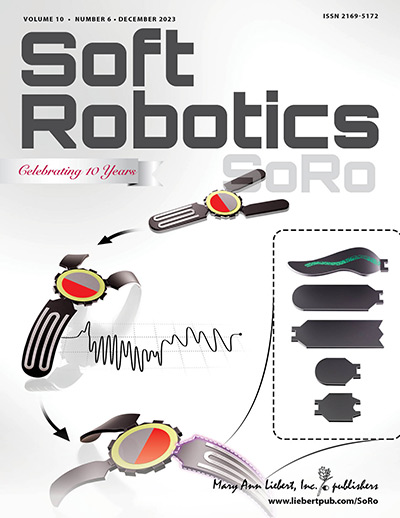GripDepthSense3DNet:一个支持深度的软机器人抓取硬度传感框架。
IF 6.1
2区 计算机科学
Q1 ROBOTICS
引用次数: 0
摘要
尽管开发了许多设计用于处理可变形物体的软夹具,但硬度传感仍然是一个挑战,但它对于产品选择或分类,评估水果成熟度或食品质量控制等各种应用至关重要。本研究引入了GripDepthSense3DNet,这是一种将3D深度传感与机器学习相结合的创新方法,可在抓取过程中精确感知硬度。利用由不同物体正在变形的深度图像组成的数据集,所提出的新网络被训练以从一系列深度图像中捕获复杂的时空变形特征。GripDepthSense3DNet优于最先进的网络,在训练形状和硬度方面表现出值得称赞的0.46%的平均绝对百分比误差。具体来说,与ResNet-50相比,该模型的参数减少了约94.8%,在同等硬件上的训练时间缩短了约92.9%。研究了不同的深度范围和间隔,最终得到了最佳配置。通过动态调整,网络能够无缝地整合新形状、新硬度,甚至复杂的任意对象,这突出了该方法的适应性。本文章由计算机程序翻译,如有差异,请以英文原文为准。
GripDepthSense3DNet: A Depth-Enabled Hardness Sensing Framework in Soft Robotic Grasping.
Despite the development of numerous soft grippers designed to handle deformable objects, hardness sensing remains a challenge, yet it is essential for various applications such as product selection or sorting, assessing fruit ripeness, or food quality control. This research introduces GripDepthSense3DNet, an innovative approach integrating 3D depth sensing with machine learning for accurate hardness sensing during grasping. Leveraging a dataset comprising of depth images of diverse objects undergoing deformation, the proposed novel network is trained to capture intricate spatial-temporal deformation features from a series of depth images. GripDepthSense3DNet outperforms state-of-the-art networks, exhibiting a commendable mean absolute percentage error of 0.46% for trained shapes and hardness. Specifically, the model achieves a reduction in parameters of approximately 94.8% compared to ResNet-50, with a training time that is around 92.9% shorter on equivalent hardware. Different depth ranges and intervals were studied to eventually arrive at an optimal configuration. Through dynamic tuning, the network's ability to seamlessly incorporate new shapes, new hardness, and even intricate arbitrary objects highlights the adaptability of the approach.
求助全文
通过发布文献求助,成功后即可免费获取论文全文。
去求助
来源期刊

Soft Robotics
ROBOTICS-
CiteScore
15.50
自引率
5.10%
发文量
128
期刊介绍:
Soft Robotics (SoRo) stands as a premier robotics journal, showcasing top-tier, peer-reviewed research on the forefront of soft and deformable robotics. Encompassing flexible electronics, materials science, computer science, and biomechanics, it pioneers breakthroughs in robotic technology capable of safe interaction with living systems and navigating complex environments, natural or human-made.
With a multidisciplinary approach, SoRo integrates advancements in biomedical engineering, biomechanics, mathematical modeling, biopolymer chemistry, computer science, and tissue engineering, offering comprehensive insights into constructing adaptable devices that can undergo significant changes in shape and size. This transformative technology finds critical applications in surgery, assistive healthcare devices, emergency search and rescue, space instrument repair, mine detection, and beyond.
 求助内容:
求助内容: 应助结果提醒方式:
应助结果提醒方式:


